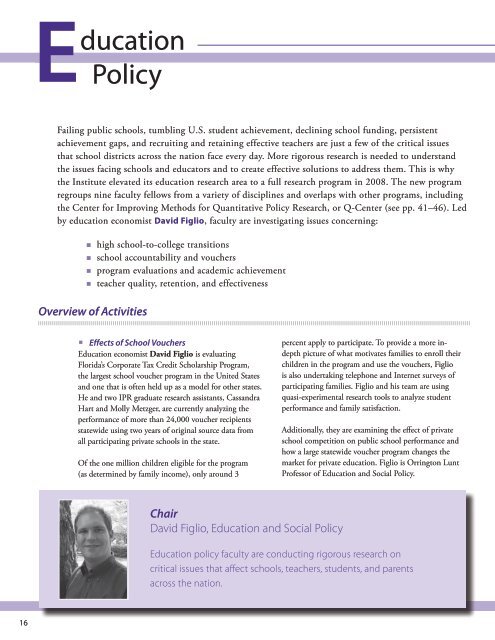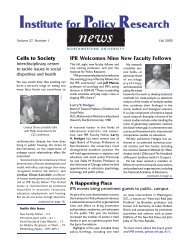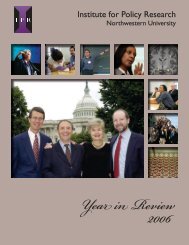IPR - Institute for Policy Research - Northwestern University
IPR - Institute for Policy Research - Northwestern University
IPR - Institute for Policy Research - Northwestern University
Create successful ePaper yourself
Turn your PDF publications into a flip-book with our unique Google optimized e-Paper software.
E<br />
ducation<br />
<strong>Policy</strong><br />
Failing public schools, tumbling U.S. student achievement, declining school funding, persistent<br />
achievement gaps, and recruiting and retaining effective teachers are just a few of the critical issues<br />
that school districts across the nation face every day. More rigorous research is needed to understand<br />
the issues facing schools and educators and to create effective solutions to address them. This is why<br />
the <strong>Institute</strong> elevated its education research area to a full research program in 2008. The new program<br />
regroups nine faculty fellows from a variety of disciplines and overlaps with other programs, including<br />
the Center <strong>for</strong> Improving Methods <strong>for</strong> Quantitative <strong>Policy</strong> <strong>Research</strong>, or Q-Center (see pp. 41–46). Led<br />
by education economist David Figlio, faculty are investigating issues concerning:<br />
• high school-to-college transitions<br />
• school accountability and vouchers<br />
• program evaluations and academic achievement<br />
• teacher quality, retention, and effectiveness<br />
Overview of Activities<br />
< Effects of School Vouchers<br />
Education economist David Figlio is evaluating<br />
Florida’s Corporate Tax Credit Scholarship Program,<br />
the largest school voucher program in the United States<br />
and one that is often held up as a model <strong>for</strong> other states.<br />
He and two <strong>IPR</strong> graduate research assistants, Cassandra<br />
Hart and Molly Metzger, are currently analyzing the<br />
per<strong>for</strong>mance of more than 24,000 voucher recipients<br />
statewide using two years of original source data from<br />
all participating private schools in the state.<br />
Of the one million children eligible <strong>for</strong> the program<br />
(as determined by family income), only around 3<br />
percent apply to participate. To provide a more indepth<br />
picture of what motivates families to enroll their<br />
children in the program and use the vouchers, Figlio<br />
is also undertaking telephone and Internet surveys of<br />
participating families. Figlio and his team are using<br />
quasi-experimental research tools to analyze student<br />
per<strong>for</strong>mance and family satisfaction.<br />
Additionally, they are examining the effect of private<br />
school competition on public school per<strong>for</strong>mance and<br />
how a large statewide voucher program changes the<br />
market <strong>for</strong> private education. Figlio is Orrington Lunt<br />
Professor of Education and Social <strong>Policy</strong>.<br />
Chair<br />
David Figlio, Education and Social <strong>Policy</strong><br />
Education policy faculty are conducting rigorous research on<br />
critical issues that affect schools, teachers, students, and parents<br />
across the nation.<br />
16
















